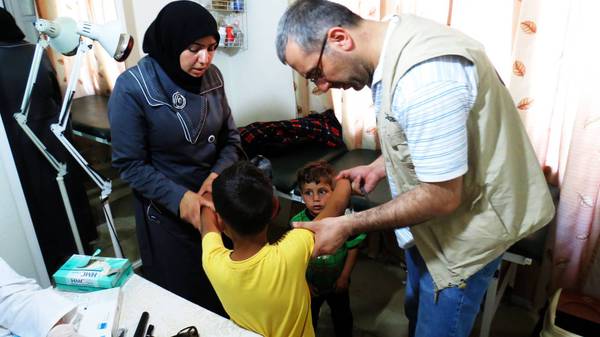At the beginning of July, Patrick Nicholson from Caritas Internationalis, visited Lebanon where he met many Syrian refugees. Below is the translation of his message, this time focused on describing health care provided by Caritas Lebanon.
“Bodies were everywhere,” says Ali. “If we wanted to live we had two options: Turkey or Lebanon. We came to Lebanon because I thought I could find a job here.”
Ali (49), Aaicha (34) and their five kids came to Lebanon 18 months ago from Idlib in northwest Syria. The turning point came when a rocket hit the house next door killing 18 people. Since the outbreak of the conflict at the beginning of 2011, their life was constantly deteriorating. The electricity wasn't working and the water wasn't running. Inflation got out of control. Something that cost 15 Syrian pounds before the war started now costs 150 pounds. “In order to buy some bread you had to be standing in a queue for 3 hours,” says Ali. There were bombs, rockets and air strikes.
After coming to Lebanon the whole family lived in a small tent. Nowadays, they rent a room for 250 dollars per month in the Mount Lebanon area. Ali wasn't able to find a permanent job and it is very difficult for him to make ends meet. “At least it is safe here but our financial situation is stressing me,” says Ali. Food and the money for rent are the most important.
Ali and Aicha brought their children, Rafah and Abdullah, to the center of Lebanese Caritas in the city of Rayfoun for vaccinations. It is one of the health services provided to Syrian refugees.
“We provide primary care, tests and medicines to the refugees for free,” says Rania Bteich, employee of the Lebanese Caritas who works at the center. They also provide vaccination, paediatric examination, maternity services, and psychiatric care in case of trauma. “There is a lot of anxiety and stress here,” she continues.
In the course of the following months, Caritas Lebanon will provide necessary primary health care for 1,500 Syrian refugees. It will also arrange bridging treatment of serious illnesses for 500 of them. The health programme also includes a mobile Caritas clinic, which goes round the Bikée valley providing health care to local Syrian refugees.
“We are often confronted with diarrhoea,” says Dr. Joseph Homsi who went with the mobile clinic to Caritas center in the city of Taalabaya. Scabies, lice and skin allergies occur frequently, as well as leishmanias – very obnoxious parasites, which cause fatal wounds on skin.
“The majority of these problems are caused by unhygienic life conditions,” says Dr. Joseph. Caritas organizes information sessions for refugees about certain health topics showing simple techniques for health protection and infection prevention.
 Nour Al Hlwa (23) brought her children, Abdel Rahman (6) and Yamen (4), to Dr. Joseph because they had
Nour Al Hlwa (23) brought her children, Abdel Rahman (6) and Yamen (4), to Dr. Joseph because they had
fevers. Her family came to Lebanon a few days ago after they fled from Syrian capital, Damascus. They left because of bombing, kidnapping, lack of food and absence of schools and hospitals. “The most important thing was to protect our children,” she says. “It is not possible to live safely in Syria.”
She is concerned about how they will manage to survive. “First, we need to find a job for my husband,” she says. “If he works we don't need charity. We will be able to buy clothes, mattresses and food for ourselves.” However, there are more than one million Syrians in the same situation. Everyone needs a job hence the wages are lowered.
Nour hopes that the war is going to end, then her family could go back home. Ali and Aaicha as well. But when they are asked how long it will take to restore peace in Syria, Ali responds: “Ten years, maybe.”
Alongside healthcare activities, there will be hygienic sets, clothes, fuel vouchers, blankets and other help provided by Caritas for 15, 000 people in the following six months. Caritas will also contribute to rent for 400 families and it will help a thousand children with commuting to school.
“Our task is to stand by them,” says the president of Lebanese Caritas, father Simon Faddoul. “People need not only material aid, but also our love. Our Caritas employees are there to listen to their grief and it renews the hope in them.”
“The crisis in Syria is one of the most demanding challenges we have ever faced. I am overwhelmed by the resilience of Syrian refugees though,” adds father Simon. “Their unrelenting human spirit gives us hope, too.”
Author of the article: Patrick Nicholson/Caritas Internationalis
Author of the photographs: Joelle El Dib from Caritas Lebanon
Introductory photos: Doctor distributing drugs in the health center of Lebanese Caritas in Reyfoun
If you would like to support Syrian refugees in Jordan or Lebanon, you can send a donation to Caritas for Syria.







